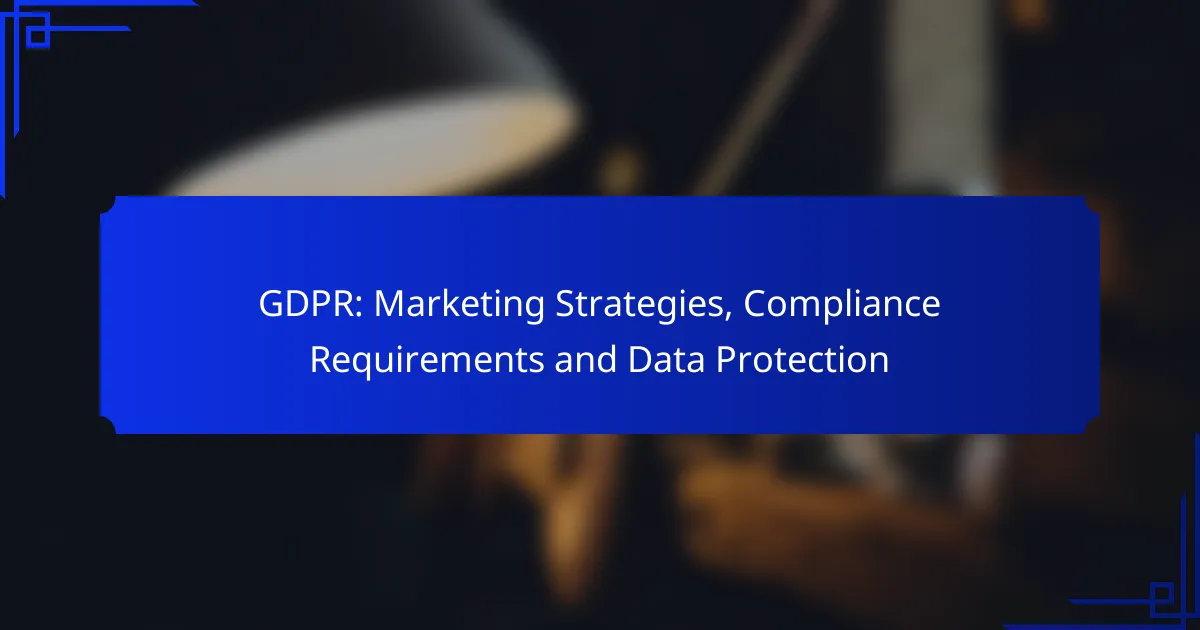The General Data Protection Regulation (GDPR) significantly impacts marketing strategies by emphasizing the importance of compliance and data protection. Marketers must focus on transparency, obtain explicit consent from customers, and respect their data rights to build trust and foster long-term relationships. By integrating these principles, organizations can effectively engage with their audience while adhering to legal requirements.
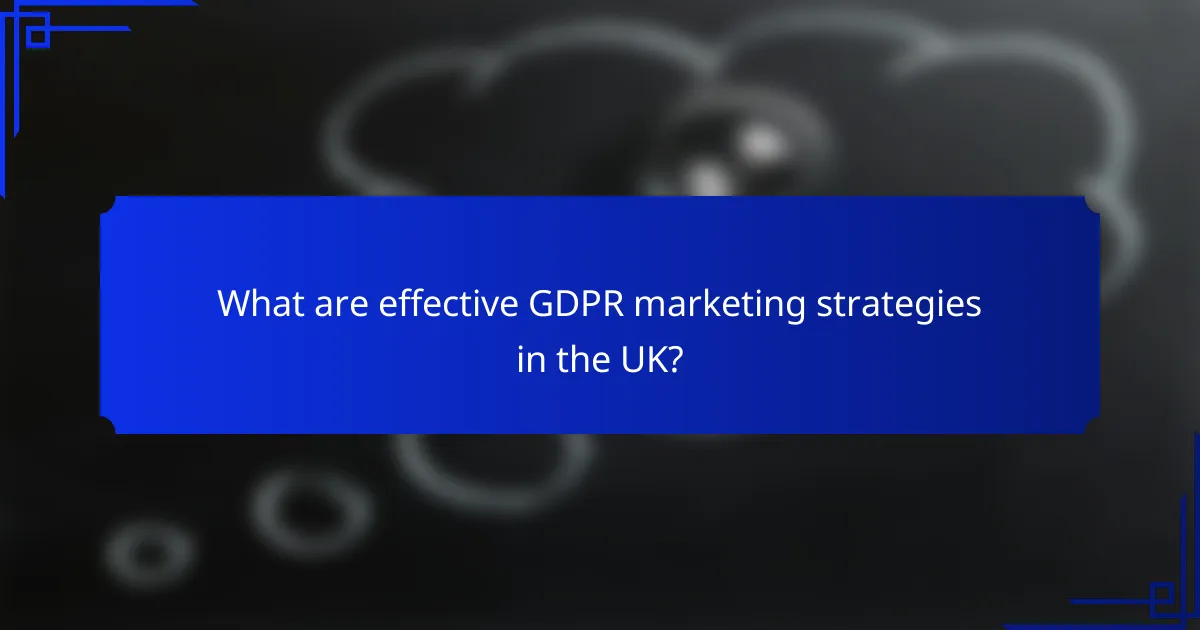
What are effective GDPR marketing strategies in the UK?
Effective GDPR marketing strategies in the UK focus on compliance while maximizing customer engagement. These strategies prioritize transparency, consent, and data protection to build trust and foster long-term relationships with customers.
Personalized email marketing
Personalized email marketing can be highly effective under GDPR when it respects user consent and preferences. Marketers should segment their audience based on interests and behaviors, ensuring that each email resonates with the recipient’s needs.
To comply with GDPR, obtain explicit consent before sending personalized emails and provide an easy opt-out option. Using tools that track engagement can help refine your approach while maintaining compliance.
Content marketing compliance
Content marketing must align with GDPR by ensuring that any data collected is done so lawfully and transparently. This includes providing clear information about how user data will be used and obtaining consent where necessary.
Incorporate privacy notices within your content, such as blog posts or downloadable resources, to inform users about data handling practices. This builds trust and encourages users to engage with your content while remaining compliant.
Transparent data collection practices
Transparent data collection practices are essential for GDPR compliance. Clearly communicate what data you are collecting, why you are collecting it, and how it will be used.
Utilize straightforward language in your privacy policy and ensure it is easily accessible. Consider using pop-ups or banners that inform users about data collection at the point of entry, enhancing transparency and trust.
Customer consent management
Effective customer consent management is crucial under GDPR. Marketers must ensure that consent is freely given, specific, informed, and unambiguous.
Implement systems to track and manage consent, allowing customers to easily modify their preferences. Regularly review consent records to ensure compliance and maintain customer trust.
Data minimization techniques
Data minimization techniques involve collecting only the data necessary for specific purposes, aligning with GDPR principles. This reduces the risk of data breaches and enhances customer privacy.
Evaluate your data collection processes and eliminate any unnecessary information requests. For instance, if a user only needs to provide an email address for a newsletter, avoid asking for additional personal details unless absolutely necessary.
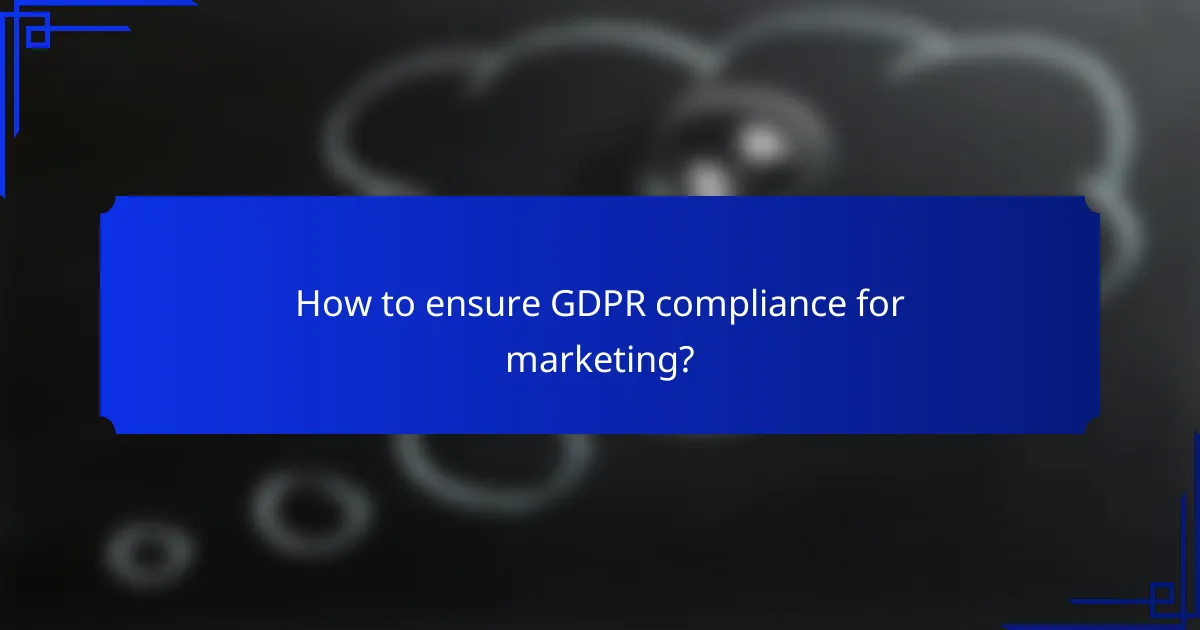
How to ensure GDPR compliance for marketing?
To ensure GDPR compliance for marketing, organizations must prioritize transparency, consent, and data protection. This involves understanding data handling practices and implementing necessary measures to protect personal information.
Conducting data audits
Conducting data audits is essential for identifying what personal data you hold and how it is used. Start by mapping out data flows, including collection sources, storage locations, and processing activities. Regular audits help ensure that data practices align with GDPR requirements.
Consider using a checklist to evaluate data types, processing purposes, and retention periods. This will help you identify any areas where compliance may be lacking and allow for timely corrective actions.
Implementing privacy policies
Implementing clear privacy policies is crucial for informing customers about their data rights and how their information is used. Your policy should outline the types of data collected, the purpose of processing, and the legal basis for data handling.
Make your privacy policy easily accessible on your website and ensure it is written in plain language. Regularly review and update the policy to reflect any changes in data processing activities or regulations.
Training staff on GDPR
Training staff on GDPR is vital for fostering a culture of compliance within your organization. Employees should understand their responsibilities regarding data protection and the importance of safeguarding personal information.
Consider conducting regular training sessions and providing resources that cover key GDPR principles, such as consent, data minimization, and the rights of individuals. This will help reduce the risk of non-compliance due to human error.
Utilizing consent management platforms
Utilizing consent management platforms (CMPs) can streamline the process of obtaining and managing user consent. CMPs help ensure that consent is collected in a compliant manner and that users can easily withdraw their consent when desired.
Choose a CMP that offers features like customizable consent forms, detailed reporting, and integration with your marketing tools. This will help you maintain records of consent and demonstrate compliance during audits.
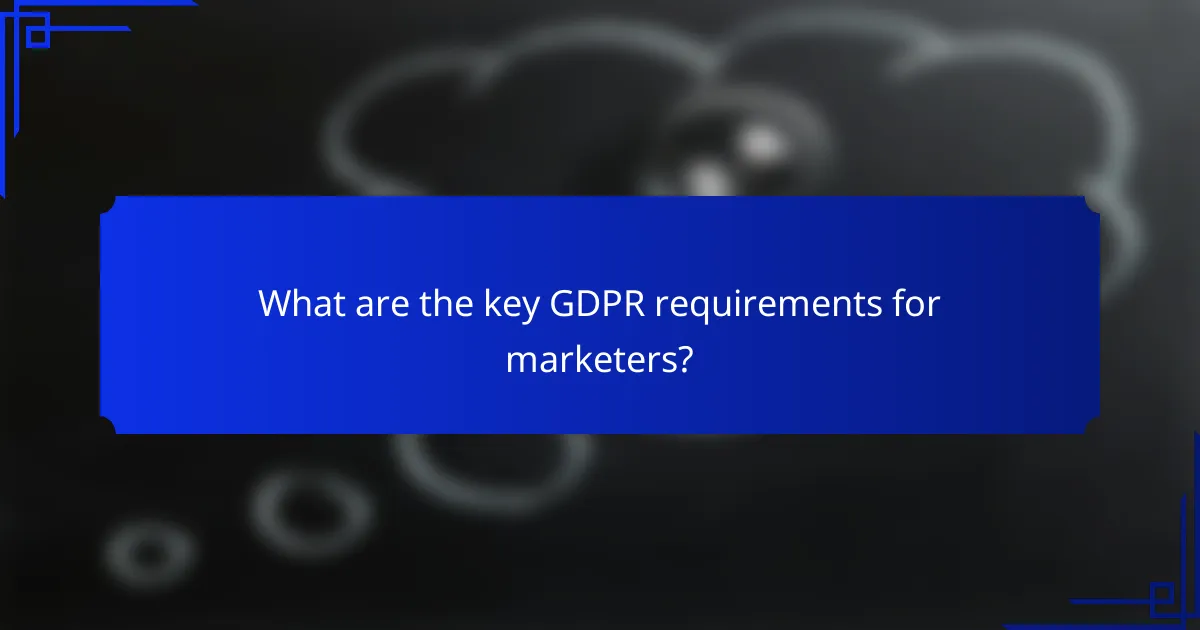
What are the key GDPR requirements for marketers?
The General Data Protection Regulation (GDPR) imposes several key requirements on marketers to ensure the protection of personal data. Marketers must prioritize transparency, obtain consent, and respect individuals’ rights regarding their data.
Data subject rights
Under GDPR, individuals have specific rights regarding their personal data. These include the right to access their data, the right to rectify inaccuracies, the right to erase data, and the right to restrict processing. Marketers must implement processes to facilitate these rights effectively.
For example, if a customer requests access to their data, marketers should be prepared to provide a copy of the data within one month. Failure to comply can lead to significant penalties.
Legal bases for processing
Marketers must identify a legal basis for processing personal data, as outlined in GDPR. The most common bases include consent, contractual necessity, legal obligation, vital interests, public task, and legitimate interests. Each basis has specific requirements that must be met.
For instance, if relying on consent, marketers must ensure that it is freely given, specific, informed, and unambiguous. This often means using clear opt-in mechanisms rather than pre-checked boxes.
Data breach notification protocols
GDPR requires that organizations notify relevant authorities and affected individuals of data breaches within 72 hours of becoming aware of the breach. Marketers must have protocols in place to detect, report, and investigate breaches promptly.
In practice, this means establishing a clear communication plan and training staff on how to recognize and report potential breaches. Failure to notify can result in hefty fines and damage to reputation.
Record-keeping obligations
Marketers are required to maintain detailed records of data processing activities. This includes information on what data is processed, the purpose of processing, and the legal basis for processing. Keeping accurate records helps demonstrate compliance with GDPR.
Organizations with 250 or more employees must document all processing activities, while smaller organizations may only need to keep records for activities that pose a risk to data subjects’ rights. Regular audits can help ensure these records are up-to-date and compliant.

What tools can assist with GDPR compliance?
Several tools can help organizations ensure compliance with GDPR regulations by managing data protection and privacy effectively. These tools streamline processes such as data mapping, consent management, and overall compliance management.
OneTrust for data mapping
OneTrust is a leading platform for data mapping that helps businesses identify and categorize personal data across their systems. It offers features like automated data discovery and visual mapping tools, making it easier to understand data flows and ensure compliance with GDPR requirements.
When using OneTrust, organizations can create detailed records of processing activities, which are essential for demonstrating compliance. This tool is particularly useful for companies handling large volumes of personal data, as it simplifies the documentation process.
TrustArc for compliance management
TrustArc provides a comprehensive compliance management solution that assists organizations in navigating GDPR requirements. It offers tools for risk assessments, policy management, and ongoing compliance monitoring, ensuring that businesses stay up-to-date with regulatory changes.
With TrustArc, companies can automate compliance workflows and generate reports that demonstrate adherence to GDPR. This can save time and reduce the risk of non-compliance penalties, making it a valuable asset for any organization focused on data protection.
Cookiebot for consent management
Cookiebot is a specialized tool for managing user consent regarding cookies and tracking technologies, which is a critical aspect of GDPR compliance. It allows businesses to obtain, document, and manage consent from users effectively, ensuring transparency in data collection practices.
By implementing Cookiebot, organizations can customize consent banners and manage user preferences easily. This tool helps maintain compliance while enhancing user trust, as it provides clear information about data usage and allows users to control their privacy settings.
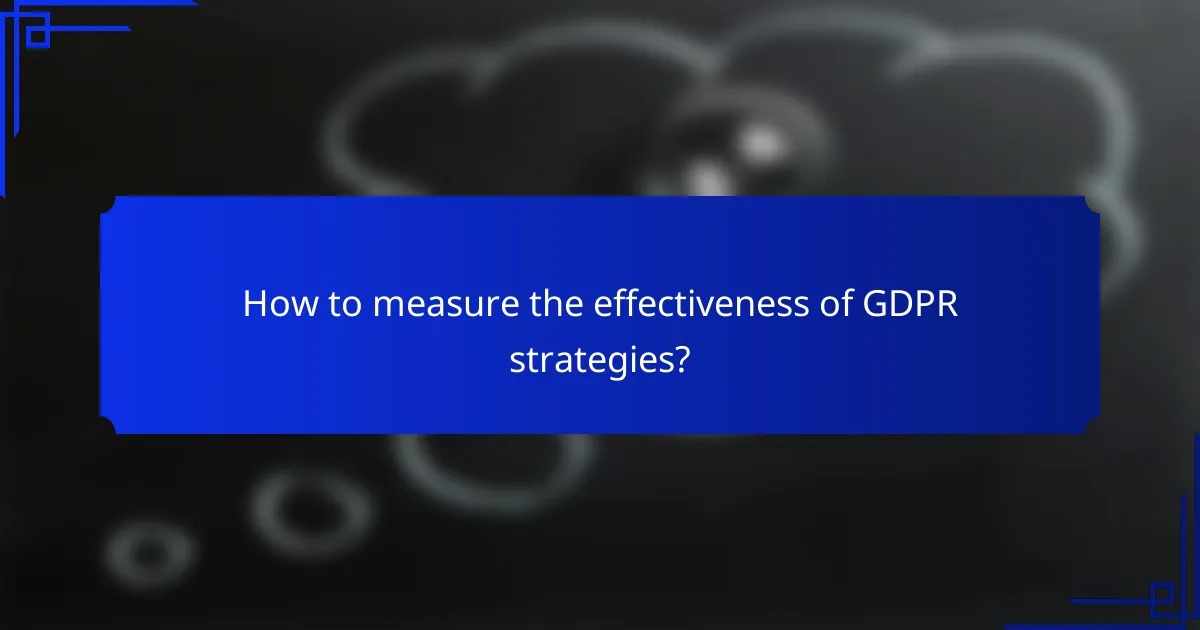
How to measure the effectiveness of GDPR strategies?
Measuring the effectiveness of GDPR strategies involves evaluating compliance, customer trust, and data protection outcomes. Key metrics include customer feedback, incident reports, and the results of data protection impact assessments.
Monitoring customer feedback
Customer feedback is crucial for assessing the effectiveness of GDPR strategies. Regularly solicit input through surveys, reviews, and direct communication to gauge how customers perceive your data handling practices.
Consider tracking metrics such as Net Promoter Score (NPS) or Customer Satisfaction Score (CSAT) to quantify customer sentiment. Aim for a response rate of at least 10-15% to ensure your feedback is representative.
Analyzing data protection impact assessments
Data protection impact assessments (DPIAs) are essential tools for measuring GDPR compliance. They help identify risks related to personal data processing and evaluate the effectiveness of implemented measures.
When conducting a DPIA, focus on documenting the nature of the data processed, potential risks, and mitigation strategies. Review these assessments regularly, ideally annually or whenever significant changes occur in data processing activities.
